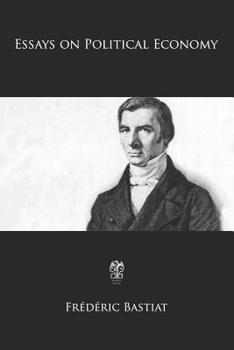Essays on Political Economy
Select Format
Select Condition 
Book Overview
Bastiat asserted that the only purpose of government is to defend the right of an individual to life, liberty, and property. From this definition, Bastiat concluded that the law cannot defend life, liberty and property if it promotes socialist policies inherently opposed to these very things. In this way, he says, the law is perverted and turned against the thing it is supposed to defend. In Bastiat's Essays on Political Economy, he cross-examines the political economy and presents five essays on capital and interest, causality, government, the nature of money and the law.
Format:Paperback
Language:English
ISBN:1979223084
ISBN13:9781979223089
Release Date:October 2017
Publisher:Createspace Independent Publishing Platform
Length:102 Pages
Weight:0.32 lbs.
Dimensions:0.2" x 6.0" x 9.0"
Customer Reviews
3 ratings
Amazing
Published by Thriftbooks.com User , 23 years ago
The first two essays in this book not only give the reader fundamentals but expands on them. "That Which Is Not Seen and That Which is Seen" cautions men on their superficial economic notions of only looking at the direct effects of human action, instead of the indirect as well. "The Law" provides a look into the use of force, namely plunder, and how governments have engaged in legalized plunder. This book is much better than "Economics In One Lesson". Bastiat goes to greater lengths to show the reader, without a doubt, that he is correct in his thinking.I find the first two essays alone to be worth every penny.
What should be seen is this book!
Published by Thriftbooks.com User , 24 years ago
Bastiat's essays 'The Law' and 'What Is Seen and What Is Not Seen' are among the most influential and oft-quoted in libertarian thought. Just the 'broken window fallacy' in the latter essay inspired Henry Hazlitt's classic book Economics in One Lesson. These essays deflate the fallacies on which statists justify their 'solutions', speaking of which, I would bet that 'What Is Seen and What Is Not Seen' was also behind economist Thomas Sowell's quote "There are no solutions, only trade-offs." That the work of a long-dead Frenchman is still being cited by today's libertarians speaks of its importance and timelessness. Bastiat's description of "legal plunder" could have been written today, and, sadly, will probably be equally relevant two centuries hence.
Awesome
Published by Thriftbooks.com User , 25 years ago
Everytime I read an article from this book, I am amazed that I am reading a translation (from French). How can a translation of a 150 year old text be more clear, and make more sense, than contemporary attempts in the mother tongue of English? This man has one modern rival for clarity of economic common sense, and that is Murray Rothbard. It is a shame that Bastiats career was cut so short. If you want a grounding in the fundementals of economics, and the pressure and accompanying fallacies of social pressure towards government, look no further than to the works of this man. All of his works are well worth the asking price.





